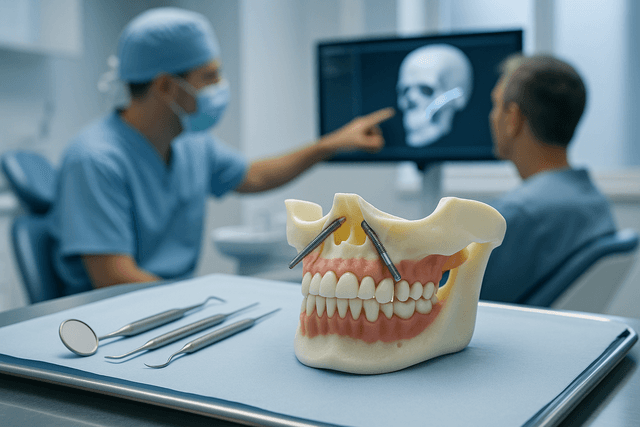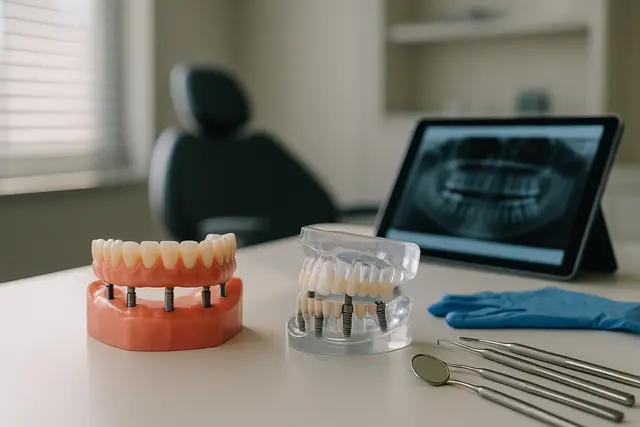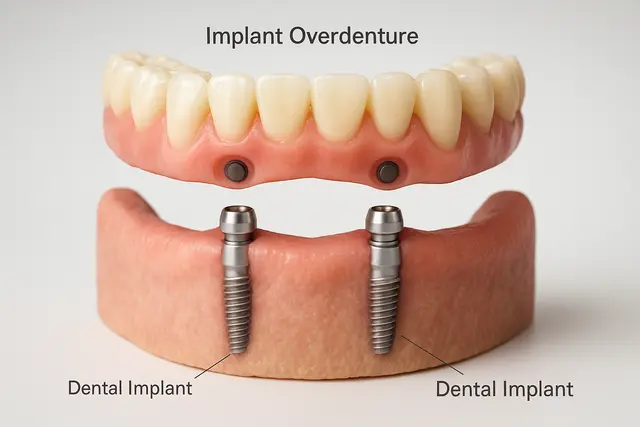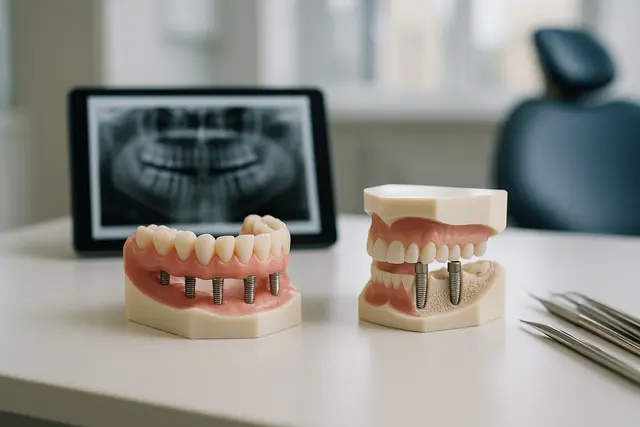Prosthodontics
4 min read
Jul 07, 2025
Zygomatic Dental Implants: A Solution for Severe Bone Loss
Missing teeth in the upper jaw is tough enough, but when you’re told there’s not enough bone for dental implants, it can feel like the door to a confident smile has slammed shut. The good news? It hasn’t. Zygomatic dental implants offer a game-changing solution for people with severe bone loss, letting you skip grafts and get back to eating, speaking, and smiling like yourself again.

The Implant Catch-22: Bone Loss and Traditional Dental Implants
Losing teeth in the upper jaw is frustrating enough; discovering there isn’t enough jawbone left to support traditional dental implants feels like a second punch to the gut. After tooth loss, the maxillary bone often shrinks, a process called resorption. Add an expanding maxillary sinus to the mix and you get a ridge that’s simply too thin or too soft.
A bone graft or sinus lift can rebuild height, but those extra surgeries lengthen treatment, raise costs, and give “dentist anxiety” more room to grow. Patients with severe bone loss are frequently told they aren’t a candidate for dental implant therapy, even though they still crave a rock-solid smile.
Zygomatic Implant Magic: Locking Into the Zygoma
When regular dental implants can’t find an anchor, surgeons look north, literally. A zygomatic implant is a long screw that skips the weakened alveolar ridge and locks into the dense zygomatic bone of the cheekbone. By traveling through the atrophic maxilla and docking in this sturdy structure, the implant provides the stability grafts aim for without the waiting game.
On the day of surgery the implant is placed and, thanks to that immediate anchor, a temporary prosthesis often goes on the same afternoon. Because the zygomatic bone has remarkable density and blood supply, healing is brisk and the risk of implant failure from poor bone quality or quantity is dramatically reduced.
Candidate for Zygomatic Dental Implants: Are You in the Club?
You might be a candidate for zygomatic dental implants if you’ve been told there is insufficient bone in the upper jaw for traditional implants, if past grafting procedures didn’t work, or if denture glue now ranks among your daily essentials.
A few things to consider:
Patients with uncontrolled diabetes
Previous implant placement experience required
A thorough evaluation is key. A 3-D CBCT scan maps the maxillary sinus, zygomatic bone, and any vital nerves, allowing precise implant placement while avoiding unpleasant surprises.
Benefits of Zygomatic Solutions vs Graft and Sinus Lift
Why choose a zygomatic dental implant over graft plus sinus lift?
Fewer surgeries mean a shorter timeline
Immediate function, chewing pizza the same evening is possible
Reduced swelling, pain, and sinus complications
Removable dentures are no longer your only option
Lower overall treatment cost by cutting out multiple OR visits
And let’s be honest, finally ditching your denture glue may be the biggest win of all.
Tackling Maxilla Resorption: Quad Zygoma and Other Tricks
Some mouths need extra horsepower. In cases of extreme bone loss or an atrophic maxilla where even the front ridge has thinned, surgeons may place two zygomatic implants per side, a protocol nicknamed quad zygoma.
These four anchors, paired with two or more conventional implants upfront when enough bone exists, create a bridge support strong enough for a full upper arch prosthetic. Guided surgery tools help thread these longer-than-traditional screws with millimetric accuracy, protecting the maxillary sinus and ensuring the implant is positioned at the ideal angle for the final prosthesis.
Implant Survival: How Long Do Zygomatic Dental Implants Last?
Longevity matters. Studies published in the Journal of Prosthetic Dentistry report implant survival rates above 96 percent after five years, on par with or better than conventional devices.
Complications of zygomatic implants may include:
Mild sinusitis
Soft tissue irritation
Rare nerve sensations
They usually appear early and are manageable when caught quickly. Practicing good oral hygiene, scheduling regular checkups with your dentist, and quitting smoking improve the odds. When cared for properly, these implants can last just as long as any other advanced system.
When All-on-4® Implants Are Needed and Bone Is Missing
The All-on-4® method relies on four strategically tilted fixtures to support an upper arch bridge. But what if the bone in the upper jaw for traditional tilts has already vanished? Surgeons can swap the two rear posts for zygomatic dental implants, keeping the same prosthetic workflow while bypassing the shortage of bone.
This method offers:
Immediate function
A confident bite without waiting months for a bone graft
Proven success for severe bone loss cases
Learn more about this treatment in our All-on-4® cost comparison or explore our before-and-after implant gallery to see the results.
Quick Side Note on Comfort and Recovery
Most people are surprised that zygomatic oral surgery feels similar to having wisdom teeth out, mild soreness, some swelling, and a few days of soft foods. Because the dense bone provides instant stability, you’re less likely to baby-sit the area compared to after a large graft. Just follow the post-op instructions, keep the area clean, and you’ll be back to crunchy apples before you know it.
Final Word Worth Chewing On
If missing or damaged teeth, a resorbed ridge, or failed grafts have left you doubting whether fixed teeth are possible, zygomatic dental implants may be your comeback story. They anchor into strong bone you already own, skip extra surgeries, and let you reach full-smile status faster than you thought possible. Ready to take the next step? Talk to implant specialists about a treatment plan tailored to your anatomy, and stop letting severe bone loss dictate what, and how, you eat.
What Are Zygomatic Dental Implants and How Do They Work?
Zygomatic implants are long dental implants anchored into the cheekbone (zygoma) instead of the upper jawbone. They bypass areas with bone loss and offer immediate stability, making them a great option for patients who can’t receive traditional implants due to maxillary resorption.
Who Is a Good Candidate for Zygomatic Implants?
You may be a candidate if you've been told you lack enough upper jawbone for standard implants, have failed bone grafts, or rely heavily on dentures. A full evaluation, including a 3D CBCT scan, helps determine if your sinus and bone anatomy are suitable.
What Are the Benefits of Zygomatic Implants Over Bone Grafting?
Zygomatic implants eliminate the need for bone grafts or sinus lifts, reducing treatment time and cost. They also allow for same-day teeth in many cases, less post-op discomfort, and higher success rates in patients with severe bone loss.
How Long Do Zygomatic Dental Implants Last?
When properly placed and cared for, zygomatic implants boast a survival rate of over 96% after five years. With good oral hygiene and regular dental visits, they can last just as long as conventional implants, even in challenging bone conditions.
Read Next
Related Posts

Prosthodontics
Implant Supported Dentures Overview
Missing teeth can impact more than just your smile, they can affect your confidence, comfort, and even your diet. Fortunately, modern dentistry offers a solution that’s both secure and natural-looking: implant-supported dentures. This innovative approach blends the stability of implants with the convenience of dentures to create a long-lasting, life-improving upgrade.
5 min read
Oct 29, 2025

Prosthodontics
Implant Overdentures Explained: The Hybrid Solution to Missing Teeth
Missing teeth can impact everything from your ability to eat to your self-confidence. While traditional dentures have long been a go-to solution, they often fall short in comfort and stability. Implant overdentures offer a modern alternative that combines the security of dental implants with the convenience of removable dentures, a true upgrade for those looking to reclaim their smile.
6 min read
Oct 29, 2025

Prosthodontics
Implant Retained Dentures Explained
Considering implant-retained dentures? You're not alone. As modern dentistry evolves, more people are turning to this secure, natural-feeling alternative to traditional dentures. This guide will walk you through what they are, how they work, and why they might be the solution you've been looking for.
4 min read
Oct 28, 2025
Don’t have time to research every dentist around you?
See why 30k+ patients trusted us